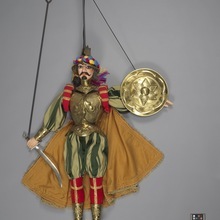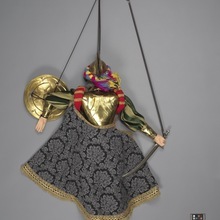String Puppet
MOA: University of British Columbia
3351/3 a-g
Opera dei Pupi puppet of the character named Ferraù. Three-dimensional marionette carved of wood (part a) with detachable head (part b) mounted on a long metal rod with a hook at the top. The face is painted with a black moustache and goatee, and grey wrinkles. He wears vertically striped green pantaloons and a tunic, red with gold applique leggings and shoulder bands, and a cape in black with grey brocade. He wears body armour including wrist and ankle guards, a neck guard (part c) and a helmet. The helmet is wrapped with braided yarn (yellow, pink and light purple-blue), tied at the back. The left wrist has a length of black-brown cord tied to it, which also attaches a small circular gold shield, with a six-point flower design, to the forearm. The right hand is clenched in a fist, which a small metal sword (parts d-f) is inserted through. The threaded end of the blade also inserts through the eye of one end of a long metal rod (part g) with an eye hook on each end. There is a metal band across the bottom of each heel. The body is jointed at the elbows, shoulders, and hips – with limbs held together by fabric underneath his outfit.
-
History Of Use
Puppet (Opera dei Pupi) representing the character Ferraù. Opera dei Pupi is an internationally recognized form of marionette theatre from Sicily. Originating in the early 1800s, Opera dei Pupi is based on medieval romances and epic stories of King Carlo Magno (Charlemagne, 742-814 CE) and his Christian knights, who defended Europe against pagan and Islamic forces. The plays involve pomp and ceremony, unrequited love, violent battles and the death of puppets, as glinting swords clash, shining armour rings, bodies split and heads tumble. One example of a scene on stage is Orlando Furioso, which is based on the Italian epic poem by Ludovico Aristo, published in 1516. It shows King Carlo Magno calling forth his faithful knights, including the brave female knight, Bradamante, in preparation for battle. One at a time, he calls their names and sings their praises. On the edge of the scene lurks the villainous Agricane, King of Mongolia, who has captured Princess Angelica, whom Orlando loves.
- Type of Item puppet
- Culture Sicilian
- Material wood, metal, paint, plastic, fibre, plant fibre
- Measurements height 129.5 cm, width 61.0 cm, depth 18.5 cm (overall)
- Creator Fratelli Fratelli Napoli
- Previous Owner Fratelli Fratelli Napoli
- Received from Fratelli Fratelli Napoli, Museum of Anthropology Exhibitions Budget
- Made in Catania
- Creation Date between 1990 and 1998
- Ownership Date before April 22, 2019
- Acquisition Date on April 22, 2019
- Condition good
- Accession Number 3351/0003

